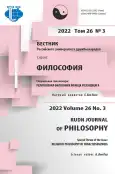Fanaticism as a Τype of Μentality in the Works of Gabriel Marcel and Karen Armstrong
- Autores: Guseynov F.I.1,2
-
Afiliações:
- Plekhanov Russian University of Economics
- Bauman Moscow State Technical University
- Edição: Volume 26, Nº 3 (2022): RELIGIOUS PHILOSOPHY OF FRANZ ROSENZWEIG
- Páginas: 697-712
- Seção: PERSON AND SOCIETY
- URL: https://journal-vniispk.ru/2313-2302/article/view/325318
- DOI: https://doi.org/10.22363/2313-2302-2022-26-3-697-712
- ID: 325318
Citar
Texto integral
Resumo
The author examines the fanatical type of mentality in its secular and religious forms based on the analysis of the works of Gabriel Marcel and Karen Armstrong. The origins of the phenomenon of fanaticism are found in the basic foundations of Modern culture as the time of the replacement of myth by logos (Armstrong) and the domination of the abstract spirit (Marcel). The understanding of the foundations of fanaticism as a broad phenomenon undertaken by the French philosopher and the British religious scholar is associated with interpretations of the concept of the transcendent. Although the socio-spiritual situation in which Marcel and Armstrong work is different, their conclusions generally coincide and become especially relevant today, when the world is on the verge of a new world war. The author briefly formulates definitions of some basic categories of G. Marcel's philosophy - "philosophical experience", "first reflection", "second reflection", "fanaticized consciousness", "disparity", "abstraction", "abstract spirit", "collective violence", "property", "being", "ideologue", "intersubjectivity", "identity", etc. Gabriel Marcel's reflection on the fundamental difference between a true believer and a religious fanatic is discussed, despite the fact that both are spoken on behalf of absolute values. The will to refuse to "question" the object of one's faith presupposes immunity to the arguments of critical thinking, which by definition would be intended to act as a kind of antidote to fanaticism as a special type of radical consciousness. The basis of fanaticism turns out to be insensitivity to what is the fanatic's idefix, while modern fanatics, in contrast to the ordinary idea of them, are often well-educated people. This is a decentered consciousness dominated by "carnal thought". Such an idea may be called the idea of equality or justice, but it is not actually a thought born from experience and sympathy for people.
Palavras-chave
Sobre autores
Farid Guseynov
Plekhanov Russian University of Economics; Bauman Moscow State Technical University
Autor responsável pela correspondência
Email: metafizika@mail.ru
ORCID ID: 0000-0002-2363-3201
PhD, Associate Professor of the Department of History and Philosophy, Plekhanov Russian University of Economics, Associate Professor of the Department of Philosophy, Bauman Moscow State Technical University
36 Stremyanny lane, Moscow, 117997, Russian Federation; 5/1, 2nd Baumanskaya street, Moscow, 105005, Russian FederationBibliografia
- Compte-Sponville A. Filosofskij slovar [Philosophical Dictionary]. Transl. by Golovina ЕV. Moscow: Eterna; 2012. (in Russian).
- Lynn Th. Fanaticized Consciousness. 2018 April 06. Available from: https://medium.com/@Quixotictom/fanaticized-consciousness-ec83397ec918
- Sneller HW. Fanaticism, Terrorism, Suicide Terrorism: Some Marcelian Perspectives. Available from: https://explore.neumann.edu/hubfs/Website-PDFs/Home/Marcel%20Studies/Marcel%202019/4-Sneller-article-2019-issue-Marcel-Studies.pdf?hsLang=en.
- Marsel G. Lyudi protiv chelovecheskogo [Man Against Mass Society]. Moscow: Centr gumanitarnyh iniciativ; 2018. (in Russian).
- Marsel G. Opyt konkretnoj filosofii [The Experience of Concrete Philosophy]. Transl. by Bol'shakova VP, Vizgina VP. Moscow: Respublika; 2004. (in Russian).
- Marsel G. V zashchitu tragicheskoj mudrosti [In Defense of Tragic Wisdom]. In: Put’ v filosofiyu. Antologiya. Moscow: PER SE; Saint Petersburg: Universitetskaya kniga; 2001. P. 243—272. (in Russian).
- Marcel G. Rome n’est plus dans Rome. Paris: La table ronde; 1960.
- Marsel G. Byt’ i imet’ [Being and Having]. Transl. by Polonskoj IN. Novocherkassk: Agentstvo Saguna; 1994. (in Russian).
- Marsel G. Paul Ricœur — Gabriel Marsel. Besedy [Paul Ricœur — Gabriel Marsel. Conversations] In: Marsel’ Gabriel’. Tragicheskaya mudrost' filosofii. Moscow: Izd-vo gumanitarnoj literatury; 1995. P. 146—187. (in Russian).
- Armstrong K. Bitva za Boga. Istoriya fundamentalizma [The battle for God. A History of Fundamentalism]. Transl. by Desyatovoj M. Moscow: Alpina non-fikshn; 2013. (in Russian).
- Antinomianizm [Antinomianism] // Novaya ZHenevskaya uchebnaya Bibliya [New Geneva Study Bible]. Available from: https://bible.by/geneva-bible/0/92/. (in Russian).
Arquivos suplementares









